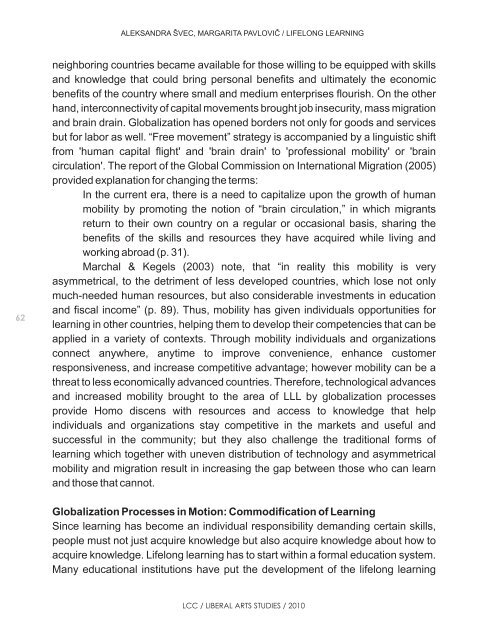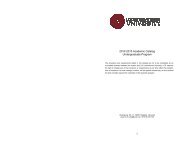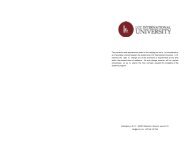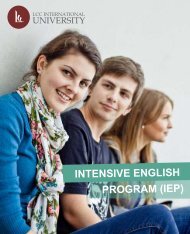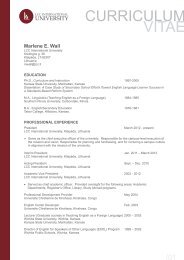lcc liberal arts studies / 2010 volume iii - LCC International University
lcc liberal arts studies / 2010 volume iii - LCC International University
lcc liberal arts studies / 2010 volume iii - LCC International University
Create successful ePaper yourself
Turn your PDF publications into a flip-book with our unique Google optimized e-Paper software.
62<br />
ALEKSANDRA ÐVEC, MARGARITA PAVLOVIÈ / LIFELONG LEARNING<br />
neighboring countries became available for those willing to be equipped with skills<br />
and knowledge that could bring personal benefits and ultimately the economic<br />
benefits of the country where small and medium enterprises flourish. On the other<br />
hand, interconnectivity of capital movements brought job insecurity, mass migration<br />
and brain drain. Globalization has opened borders not only for goods and services<br />
but for labor as well. “Free movement” strategy is accompanied by a linguistic shift<br />
from 'human capital flight' and 'brain drain' to 'professional mobility' or 'brain<br />
circulation'. The report of the Global Commission on <strong>International</strong> Migration (2005)<br />
provided explanation for changing the terms:<br />
In the current era, there is a need to capitalize upon the growth of human<br />
mobility by promoting the notion of “brain circulation,” in which migrants<br />
return to their own country on a regular or occasional basis, sharing the<br />
benefits of the skills and resources they have acquired while living and<br />
working abroad (p. 31).<br />
Marchal & Kegels (2003) note, that “in reality this mobility is very<br />
asymmetrical, to the detriment of less developed countries, which lose not only<br />
much-needed human resources, but also considerable investments in education<br />
and fiscal income” (p. 89). Thus, mobility has given individuals opportunities for<br />
learning in other countries, helping them to develop their competencies that can be<br />
applied in a variety of contexts. Through mobility individuals and organizations<br />
connect anywhere, anytime to improve convenience, enhance customer<br />
responsiveness, and increase competitive advantage; however mobility can be a<br />
threat to less economically advanced countries. Therefore, technological advances<br />
and increased mobility brought to the area of LLL by globalization processes<br />
provide Homo discens with resources and access to knowledge that help<br />
individuals and organizations stay competitive in the markets and useful and<br />
successful in the community; but they also challenge the traditional forms of<br />
learning which together with uneven distribution of technology and asymmetrical<br />
mobility and migration result in increasing the gap between those who can learn<br />
and those that cannot.<br />
Globalization Processes in Motion: Commodification of Learning<br />
Since learning has become an individual responsibility demanding certain skills,<br />
people must not just acquire knowledge but also acquire knowledge about how to<br />
acquire knowledge. Lifelong learning has to start within a formal education system.<br />
Many educational institutions have put the development of the lifelong learning<br />
<strong>LCC</strong> / LIBERAL ARTS STUDIES / <strong>2010</strong>


